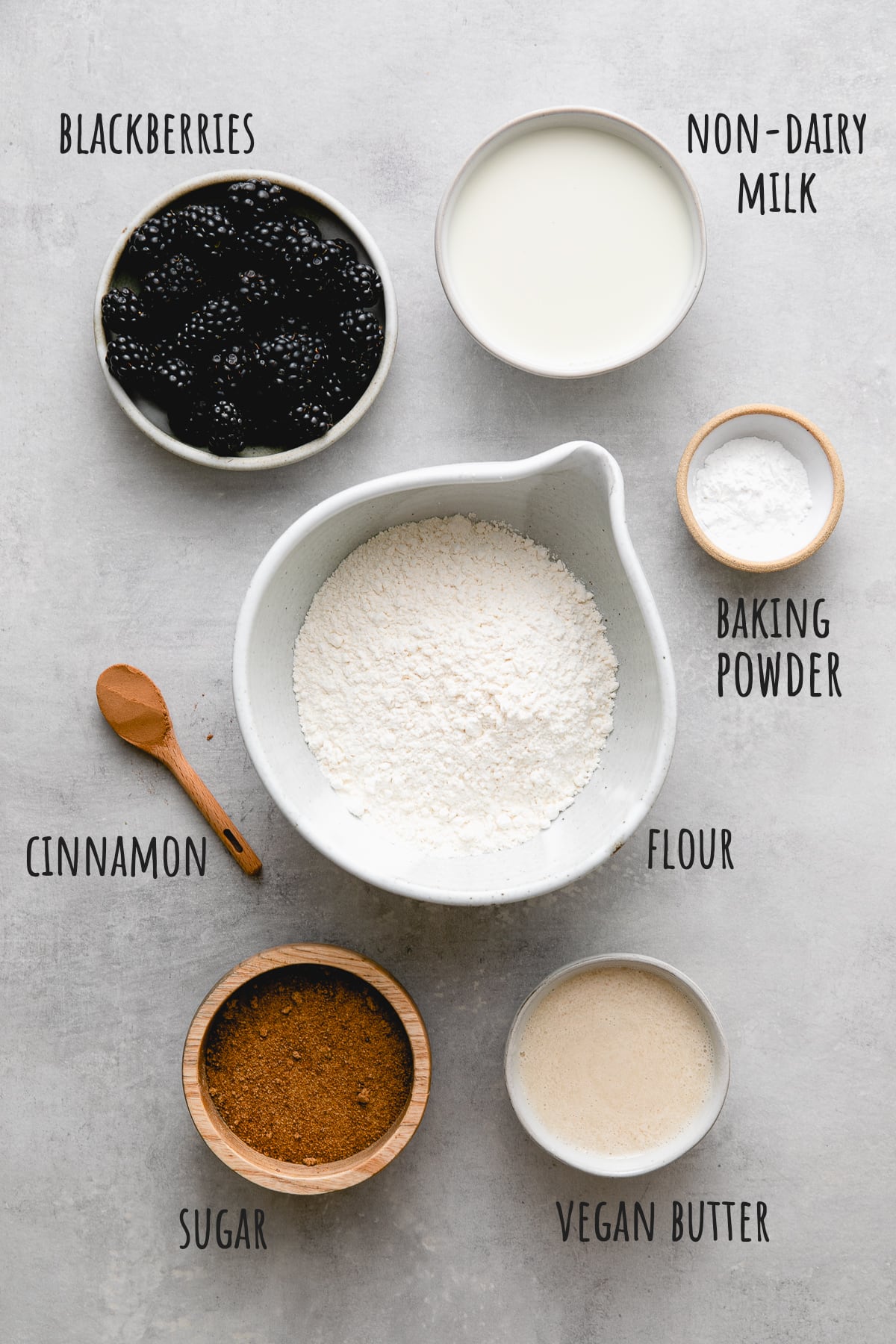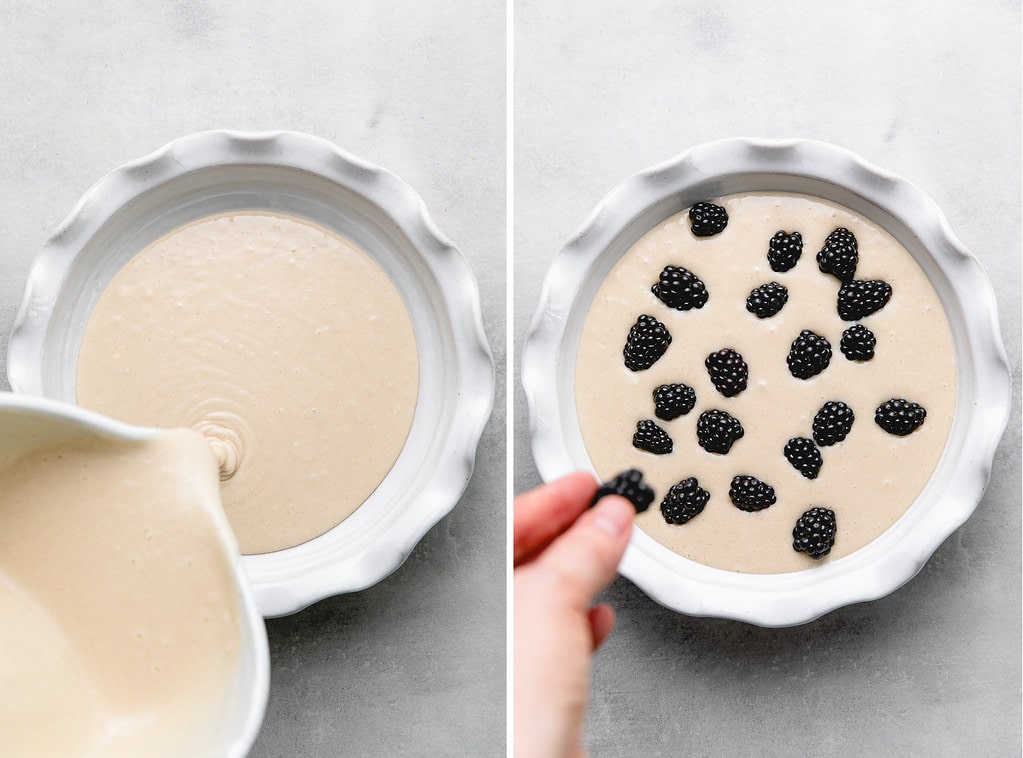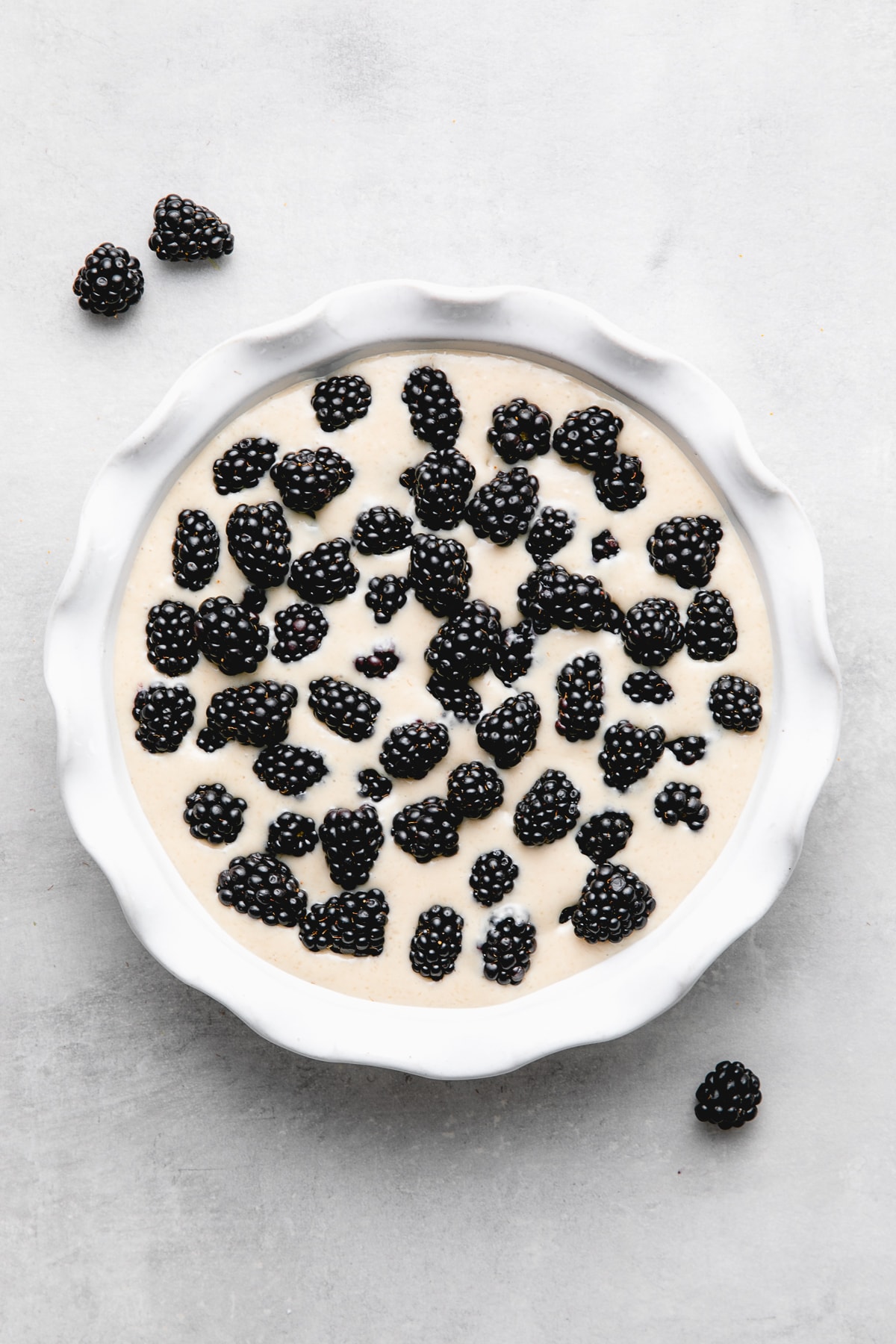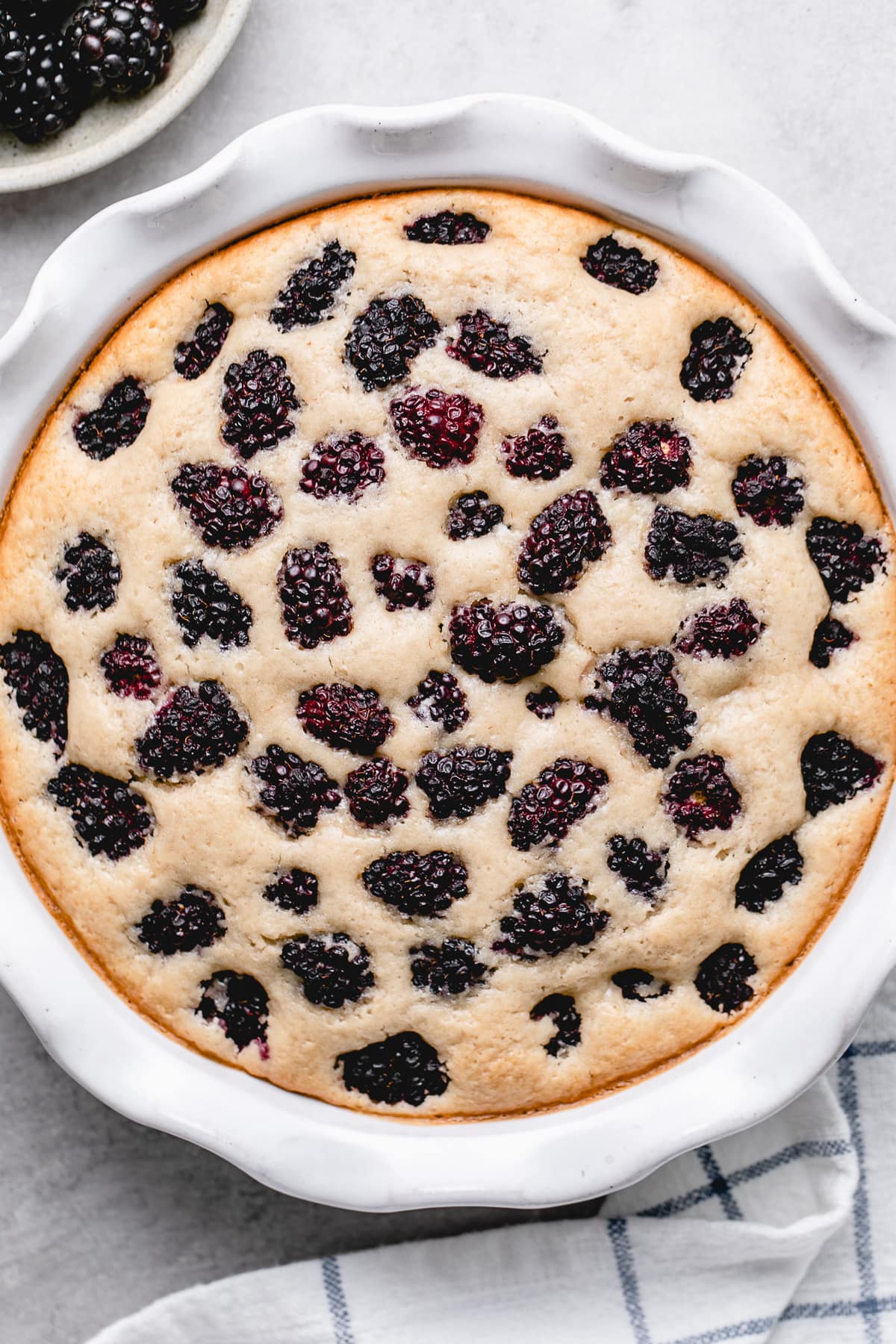Southern Blackberry Cobbler (Vegan + Easy)
This southern-style Vegan Blackberry Cobbler recipe is simple and easy to make with only 7 ingredients for a deliciously healthy snack or dessert everyone will love!

Summer is here, and blackberries are in peak season, so I thought I’d make a vegan southern blackberry cobbler from scratch, and I think it’s the best ever!
It’s not overly sweet, allowing the blackberries to shine, and with every bite, you’ll find a berry or two along with a hint of warming cinnamon. Sounds delicious, well yes, it is!
What Is A Cobbler?
Cobblers come in different styles depending on your location. Commonly, in the U.K. and parts of the U.S., they are made with the fruit at the bottom and then covered with a biscuit or batter before baking.
For this cobbler, I’ve used the technique of making a batter, pouring it into the baking dish, and dropping the blackberries over the top.
According to Wikipedia, this technique is widely used in the American South, and the result is a perfectly moist style of cake with plump, juicy fruit speckled throughout.
So without further ado, let’s make something wonderful!

Blackberry Cobbler Ingredients
First, a few notes about the main ingredients:
- Flour – Here, I used unbleached all-purpose flour. I’ve also tested this with spelt flour, which turned out great. This is a pretty forgiving recipe so you can use just about any flour. I don’t recommend coconut flour (it’s tricky in vegan baking). If using self-rising flour, you can omit the baking powder from the recipe.
- Sugar – I opted for coconut sugar, but any sugar will do. Use your favorite or whatever you have on hand.
- Vegan butter – I used my favorite Miyoko’s plant-based butter. Alternatively, coconut oil can be used in its liquid state (be sure to warm the milk before combining, or the oil will harden). And if you prefer no oil or butter, opt for using unsweetened applesauce.
- Blackberries – The berries can be fresh or frozen. I wanted this cobbler to be more fruit than batter. Typically, this style cobbler recipe calls for 2 cups of fruit. I have used 3 cups here. Feel free to use a little less if you prefer.
- Non-dairy milk – Use your favorite, preferably unsweetened plain or vanilla flavored.


How To Make Vegan Blackberry Cobbler
Making a blackberry cobbler is as easy as 1 – 2 – 3!
- Combine the flour, sugar, baking powder, cinnamon, plant milk, and oil or vegan butter and mix well.
- Pour the cobbler batter into the baking dish and top with plenty of blackberries, making sure to push them into the batter.
- Bake for 40 – 45 minutes.
And there you have it, simple as can be!
This blackberry cobbler is straightforward and ready in under an hour to enjoy and share with friends and family!
Top Tips
- Be sure to push the berries into the batter. The batter bakes up puffy and cakelike, and pushing the berries towards the bottom of the dish will ensure you will have a warm and juicy berry in every bite.
- Bake a little longer for a crispy cobbler crust. Add another 10 minutes or so for a browner and crispier crust and tender inside.
- Use a round or square dish. Both of these shapes will work, preferably with an 8 or 9-inch baking dish.

Serve it with a scoop of vanilla non-dairy ice cream, and it’s a perfect way to enjoy the season’s abundance of blackberries!
FAQs
Can I use different fruits? Absolutely. You can substitute blueberries, raspberries, diced strawberries, or cherries for the blackberries.
Can I make this recipe gluten-free? Yes, you can easily make this cobbler gluten-free by using a good gluten-free flour blend.
Can I make this blackberry cobbler butter and oil-free? Yes, using unsweetened applesauce in place of butter or oil is a healthy and easy way to make a low-fat cobbler without sacrificing anything.

More Healthy Desserts!
- Apple + Pear Crisp
- Vegan Brownies
- Vegan Chocolate Chip Cookies
- Vegan Strawberry Shortcakes
- Chocolate Chia Pudding
If you try this southern cobbler recipe, please let me know! Leave a comment and rate it below. I love to hear what you think, or any changes you make.
PrintSouthern Blackberry Cobbler (Vegan + Easy)
With only 7 ingredients, this flavorful vegan blackberry cobbler is a great way to use up the season’s abundance of blackberries!
- Prep Time: 5 min
- Cook Time: 40 min
- Total Time: 45 minutes
- Yield: Serves 6
- Category: Dessert
- Method: bake
- Cuisine: Southern, Vegan
Ingredients
- 1 cup unbleached all-purpose flour
- 1/2 cup sugar
- 1 heaped teaspoon baking powder
- 1/4 teaspoon cinnamon
- 1 cup unsweetened vanilla plant milk, warmed if using coconut oil
- 1/3 cup coconut oil or vegan butter/margarine, warmed to liquid state
- 2 – 3 cups (about 12oz.) blackberries, fresh or frozen
Instructions
Preheat oven to 350 degrees F.
Batter: In a medium bowl, whisk together the flour, sugar, baking powder, and cinnamon. If using coconut oil, be sure to warm the milk before using it, or it will harden the coconut oil when combined. Add milk and mix well. Add oil/butter and mix well again.
Assemble: Pour batter into an 8-inch baking dish. Drop blackberries into the batter, distributing them evenly. Push down some of the blackberries into the batter, then add more over top. Sprinkle a little pure cane sugar over top if you like. I would refrain from using coconut sugar, as it may burn. If you want to add coconut sugar, sprinkle it halfway through baking.
Bake: Place in oven on the middle rack and bake for 40 – 45 minutes. Let cool a few minutes and serve.
Serve: Pair with a scoop of non-dairy vanilla ice cream for dessert and a scoop of vanilla non-dairy yogurt for breakfast (yes, this would be a fine way to start your day!)
Serves 6
Store: Leftovers can be stored in the refrigerator for up to 5 days. Warm serving portions in the microwave or oven set to 350 for 10 – 15 minutes.
Notes
Oil-free: Use unsweetened applesauce in place of butter or oil.
Berries: I really wanted this cobbler to be more fruit than batter. Typically this style cobbler recipe calls for 2 cups of fruit, I have used 3 cups here. Feel free to use a little less if you prefer.
Oil: Feel free to use olive oil or any other neutral oil in place of coconut oil.
FOLLOW TSV on Facebook, Instagram, Pinterest, Youtube, Subscribe (email), or RSS for more recipes and inspiration!


Delicious and easy to make. Made it with both ordinary, and second time, spelt flour. Spelt made it have a nice crust. Just wondering whether to add a bit of apple to the mix? And would it do OK if frozen to be able to make ahead?
My cobbler is still liquidy after 50 minutes?
So sorry you are having issues, Peggy! I am not sure what could be this issue. Can you tell me what you used so I can troubleshoot. How many berries did you use? What type of flour? ect…
I’m not a skilled cook but this recipe turned out beautifully 👏🙃. About to make it again with nectarines. Thank You
Delicious! I switched the cinnamon for cardamom and used Spelt instead of all purpose flour.
Can I make this with peaches? What kind of plant milk did you use?
Yes, you can use peaches. You may want to coat them with flour to help soak up some of the excess juices they will release while baking. I used almond milk, but cashew, oat, soy, and rice milk would be great too. Enjoy!
We made this as instructed and it was perfection! Thank you for the easy and delicious cobbler.
Just love this recipe!! I made it last night and we felt we were eating an old fashioned full fat treat!! I did sub all applesauce for the oil and loved it. So delicious, thank you so much, I just found your site and can’t wait to try more of your recipes.
Started trying out vegan desserts because my stomach is not what it’s used to be, and we have so many vegan friends we want to treat. And this was an absolute delight to make and eat! One of the most delicious pies!! Even on the second day it tastes amazing. Highly recommend!
This was so easy and delicious! Highly recommend